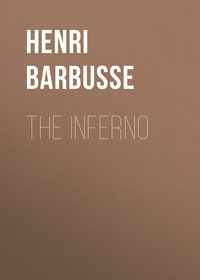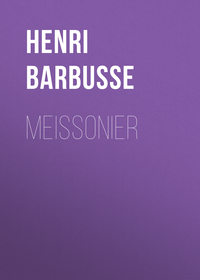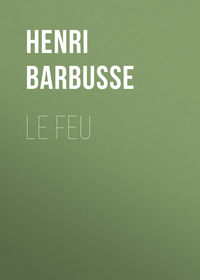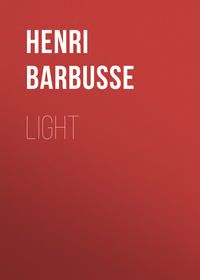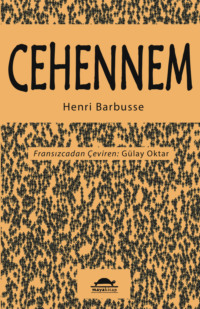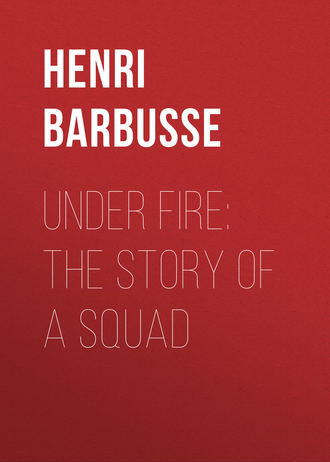 полная версия
полная версияUnder Fire: The Story of a Squad
As we reach the kennel in which we are lodgers, we are thinking that sentence over. Its touching simplicity affects me, shows me a soul—a host of souls. Because the sun has shown himself, because we have felt a gleam and a similitude of comfort, suffering exists no longer, either of the past or the terrible future. "We're all right now." There is no more to say.
Biquet establishes himself at the table, like a gentleman, to write a reply. Carefully he lays abroad his pen ink, and paper, and examines each, then smilingly traces the strictly regular lines of his big handwriting across the meager page.
"You'd laugh," he says, "if you knew what I've written to the old woman." He reads his letter again, fondles it, and smiles to himself.
VI
Habits
WE are enthroned in the back yard. The big hen, white as a cream cheese, is brooding in the depths of a basket near the coop whose imprisoned occupant is rummaging about. But the black hen is free to travel. She erects and withdraws her elastic neck in jerks, and advances with a large and affected gait. One can just see her profile and its twinkling spangle, and her talk appears to proceed from a metal spring. She marches, glistening black and glossy like the love-locks of a gypsy; and as she marches, she unfolds here and there upon the ground a faint trail of chickens.
These trifling little yellow balls, kept always by a whispering instinct on the ebb-tide to safety, hurry along under the maternal march in short, sharp jerks, pecking as they go. Now the train comes to a full stop, for two of the chickens are thoughtful and immobile, careless of the parental clucking.
"A bad sign," says Paradis; "the hen that reflects is ill." And Paradis uncrosses and recrosses his legs. Beside him on the bench, Blaire extends his own, lets loose a great yawn that he maintains in placid duration, and sets himself again to observe, for of all of us he most delights in watching fowls during the brief life when they are in such a hurry to eat.
And we watch them in unison, not forgetting the shabby old cock, worn threadbare. Where his feathers have fallen appears the naked india-rubber leg, lurid as a grilled cutlet. He approaches the white sitter, which first turns her head away in tart denial, with several "No's" in a muffled rattle, and then watches him with the little blue enamel dials of her eyes.
"We're all right," says Barque.
"Watch the little ducks," says Blaire, "going along the communication trench."
We watch a single file of all-golden ducklings go past—still almost eggs on feet—their big heads pulling their little lame bodies along by the string of their necks, and that quickly. From his corner, the big dog follows them also with his deeply dark eye, on which the slanting sun has shaped a fine tawny ring.
Beyond this rustic yard and over the scalloping of the low wall, the orchard reveals itself, where a green carpet, moist and thick, covers the rich soil and is topped by a screen of foliage with a garniture of blossom, some white as statuary, others pied and glossy as knots in neckties. Beyond again is the meadow, where the shadowed poplars throw shafts of dark or golden green. Still farther again is a square patch of upstanding hops, followed by a patch of cabbages, sitting on the ground and dressed in line. In the sunshine of air and of earth we hear the bees, as they work and make music (in deference to the poets), and the cricket which, in defiance of the fable, sings with no humility and fills Space by himself.
Over yonder, there falls eddying from a poplar's peak a magpie—half white, half black, like a shred of partly-burned paper.
The soldiers outstretch themselves luxuriously on the stone bench, their eyes half closed, and bask in the sunshine that warms the basin of the big yard till it is like a bath.
"That's seventeen days we've been here! After thinking we were going away day after day!"
"One never knows," said Paradis, wagging his head and smacking his lips.
Through the yard gate that opens on to the road we see a group of poilus strolling, nose in air, devouring the sunshine; and then, all alone, Tellurure. In the middle of the street he oscillates the prosperous abdomen of which he is proprietor, and rocking on legs arched like basket-handles, he expectorates in wide abundance all around him.
"We thought, too, that we should be as badly off here as in the other quarters. But this time it's real rest, both in the time it lasts and the kind it is."
"You're not given too many exercises and fatigues."
"And between whiles you come in here to loll about."
The old man huddled up at the end of the seat—no other than the treasure-seeking grandfather whom we saw the day of our arrival—came nearer and lifted his finger. "When I was a young man, I was thought a lot of by women," he asserted, shaking his head. "I have led young ladies astray!"
"Ah!" said we, heedless, our attention taken away from his senile prattle by the timely noise of a cart that was passing, laden and laboring.
"Nowadays," the old man went on, "I only think about money."
"Ah, oui, the treasure you're looking for, papa."
"That's it," said the old rustic, though he felt the skepticism around him. He tapped his cranium with his forefinger, which he then extended towards the house. "Take that insect there," he said, indicating a little beast that ran along the plaster. "What does it say? It says, 'I am the spider that spins the Virgin's thread.'" And the archaic simpleton added, "One must never judge what people do, for one can never tell what may happen."
"That's true," replied Paradis politely. "He's funny," said Mesnil Andre, between his teeth, while he sought the mirror in his pocket to look at the facial benefit of fine weather. "He's crazy," murmured Barque in his ecstasy.
"I leave you," said the old man, yielding in annoyance.
He got up to go and look for his treasure again, entered the house that supported our backs, and left the door open, where beside the huge fireplace in the room we saw a little girl, so seriously playing with a doll that Blaire fell considering, and said, "She's right."
The games of children are a momentous preoccupation. Only the grown-ups play.
After we have watched the animals and the strollers go by, we watch the time go by, we watch everything.
We are seeing the life of things, we are present with Nature, blended with climates, mingled even with the sky, colored by the seasons. We have attached ourselves to this corner of the land where chance has held us back from our endless wanderings in longer and deeper peace than elsewhere; and this closer intercourse makes us sensible of all its traits and habits. September—the morrow of August and eve of October, most affecting of months—is already sprinkling the fine days with subtle warnings. Already one knows the meaning of the dead leaves that flit about the flat stones like a flock of sparrows.
In truth we have got used to each other's company, we and this place. So often transplanted, we are taking root here, and we no longer actually think of going away, even when we talk about it.
"The 11th Division jolly well stayed a month and a half resting," says Blaire.
"And the 375th, too, nine weeks!" replies Barque, in a tone of challenge.
"I think we shall stay here at least as long—at least, I say."
"We could finish the war here all right."
Barque is affected by the words, nor very far from believing them. "After all, it will finish some day, what!"
"After all!" repeat the others.
"To be sure, one never knows," says Paradis. He says this weakly, without deep conviction. It is, however, a saying which leaves no room for reply. We say it over again, softly, lulling ourselves with it as with an old song.
Farfadet rejoined us a moment ago. He took his place near us, but a little withdrawn all the same, and sits on an overturned tub, his chin on his fists.
This man is more solidly happy than we are. We know it well, and he knows it well. Lifting his head he has looked in turn, with the same distant gaze, at the back of the old man who went to seek his treasure, and at the group that talks of going away no more. There shines over our sensitive and sentimental comrade a sort of personal glamour, which makes of him a being apart, which gilds him and isolates him from us, in spite of himself, as though an officer's tabs had fallen on him from the sky.
His idyll with Eudoxie has continued here. We have had the proofs; and once, indeed, he spoke of it. She is not very far away, and they are very near to each other. Did I not see her the other evening, passing along the wall of the parsonage, her hair but half quenched by a mantilla, as she went obviously to a rendezvous? Did I not see that she began to hurry and to lean forward, already smiling? Although there is no more between them yet than promises and assurances, she is his, and he is the man who will hold her in his arms.
Then, too, he is going to leave us, called to the rear, to Brigade H.Q., where they want a weakling who can work a typewriter. It is official; it is in writing; he is saved. That gloomy future at which we others dare not look is definite and bright for him.
He looks at an open window and the dark gap behind it of some room or other over there, a shadowy room that bemuses him. His life is twofold in hope; he is happy, for the imminent happiness that does not yet exist is the only real happiness down here.
So a scanty spirit of envy grows around him. "One never knows," murmurs Paradis again, but with no more confidence than when before, in the straitened scene of our life to-day, he uttered those immeasurable words.
VII
Entraining
THE next day, Barque began to address us, and said: "I'll just explain to you what it is. There are some i—"
A ferocious whistle cut his explanation off short, on the syllable. We were in a railway station, on a platform. A night alarm had torn us from our sleep in the village and we had marched here. The rest was over; our sector was being changed; they were throwing us somewhere else. We had disappeared from Gauchin under cover of darkness without seeing either the place or the people, without bidding them good-by even in a look, without bringing away a last impression.
A locomotive was shunting, near enough to elbow us, and screaming full-lunged. I saw Barque's mouth, stoppered by the clamor of our huge neighbor, pronounce an oath, and I saw the other faces grimacing in deafened impotence, faces helmeted and chin-strapped, for we were sentries in the station.
"After you!" yelled Barque furiously, addressing the white-plumed whistle. But the terrible mechanism continued more imperiously than ever to drive his words back in his throat. When it ceased, and only its echo rang in our ears, the thread of the discourse was broken for ever, and Barque contented himself with the brief conclusion, "Oui."
Then we looked around us. We were lost in a sort of town. Interminable strings of trucks, trains of forty to sixty carriages, were taking shape like rows of dark-fronted houses, low built, all alike, and divided by alleys. Before us, alongside the collection of moving houses, was the main line, the limitless street where the white rails disappeared at both ends, swallowed up in distance. Sections of trains and complete trains were staggering in great horizontal columns, leaving their places, then taking them again. On every side one heard the regular hammering on the armored ground, piercing whistles, the ringing of warning bells, the solid metallic crash of the colossal cubes telescoping their steel stumps, with the counter-blows of chains and the rattle of the long carcases' vertebrae. On the ground floor of the building that arises in the middle of the station like a town hall, the hurried bell of telegraph and telephone was at work, punctuated by vocal noises. All about on the dusty ground were the goods sheds, the low stores through whose doors one could dimly see the stacked interiors—the pointsmen's cabins, the bristling switches, the hydrants, the latticed iron posts whose wires ruled the sky like music-paper; here and there the signals, and rising naked over this flat and gloomy city, two steam cranes, like steeples.
Farther away, on waste ground and vacant sites in the environs of the labyrinth of platforms and buildings, military carts and lorries were standing idle, and rows of horses, drawn out farther than one could see.
"Talk about the job this is going to be!"—"A whole army corps beginning to entrain this evening!"—"Tiens, they're coming now!"
A cloud which overspread a noisy vibration of wheels and the rumble of horses' hoofs was coming near and getting bigger in the approach to the station formed by converging buildings.
"There are already some guns on board." On some flat trucks down there, between two long pyramidal dumps of chests, we saw indeed the outline of wheels, and some slender muzzles. Ammunition wagons, guns and wheels were streaked and blotched with yellow, brown, and green.
"They're camoufles.7 Down there, there are even horses painted. Look! spot that one, there, with the big feet as if he had trousers on. Well, he was white, and they've slapped some paint on to change his color."
The horse in question was standing apart from the others, which seemed to mistrust it, and displayed a grayish yellow tone, obviously with intent to deceive. "Poor devil!" said Tulacque.
"You see," said Paradis, "we not only take 'em to get killed, but mess them about first!"
"It's for their good, any way!"
"Eh oui, and us too, it's for our good!"
Towards evening soldiers arrived. From all sides they flowed towards the station. Deep-voiced non-coms. ran in front of the files. They were stemming the tide of men and massing them along the barriers or in railed squares—pretty well everywhere. The men piled their arms, dropped their knapsacks, and not being free to go out, waited, buried side by side in shadow.
The arrivals followed each other in volume that grew as the twilight deepened. Along with the troops, the motors flowed up, and soon there was an unbroken roar. Limousines glided through an enormous sea of lorries, little, middling, and big. All these cleared aside, wedged themselves in, subsided in their appointed places. A vast hum of voices and mingled noises arose from the ocean of men and vehicles that beat upon the approaches to the station and began in places to filter through.
"That's nothing yet," said Cocon, The Man of Figures. "At Army Corps Headquarters alone there are thirty officers' motors; and you don't know," he added, "how many trains of fifty trucks it takes to entrain all the Corpsmen and all the box of tricks—except, of course, the lorries, that'll join the new sector on their feet? Don't guess, flat-face. It takes ninety."
"Great Scott! And there are thirty-three Corps?"
"There are thirty-nine, lousy one!"
The turmoil increases; the station becomes still more populous. As far as the eye can make out a shape or the ghost of a shape, there is a hurly-burly of movement as lively as a panic. All the hierarchy of the non-coms. expand themselves and go into action, pass and repass like meteors, wave their bright-striped arms, and multiply the commands and counter-commands that are carried by the worming orderlies and cyclists, the former tardy, the latter maneuvering in quick dashes, like fish in water.
Here now is evening, definitely. The blots made by the uniforms of the poilus grouped about the hillocks of rifles become indistinct, and blend with the ground; and then their mass is betrayed only by the glow of pipes and cigarettes. In some places on the edge of the clusters, the little bright points festoon the gloom like illuminated streamers in a merry-making street.
Over this confused and heaving expanse an amalgam of voices rises like the sea breaking on the shore: and above this unending murmur, renewed commands, shouts, the din of a shot load or of one transferred, the crash of steam-hammers redoubling their dull endeavors, and the roaring of boilers.
In the immense obscurity, surcharged with men and with all things, lights begin everywhere to appear. These are the flash-lamps of officers and detachment leaders, and the cyclists' acetylene lamps, whose intensely white points zigzag hither and thither and reveal an outer zone of pallid resurrection.
An acetylene searchlight blazes blindingly out and depicts a dome of daylight. Other beams pierce and rend the universal gray.
Then does the station assume a fantastic air. Mysterious shapes spring up and adhere to the sky's dark blue. Mountains come into view, rough-modeled, and vast as the ruins of a town. One can see the beginning of unending rows of objects, finally plunged in night. One guesses what the great bulks may be whose outermost outlines flash forth from a black abyss of the unknown.
On our left, detachments of cavalry and infantry move ever forward like a ponderous flood. We hear the diffused obscurity of voices. We see some ranks delineated by a flash of phosphorescent light or a ruddy glimmering, and we listen to long-drawn trails of noise.
Up the gangways of the vans whose gray trunks and black mouths one sees by the dancing and smoking flame of torches, artillerymen are leading horses. There are appeals and shouts, a frantic trampling of conflict, and the angry kicking of some restive animal—insulted by its guide—against the panels of the van where he is cloistered.
Not far away, they are putting wagons on to railway trucks. Swarming humanity surrounds a hill of trusses of fodder. A scattered multitude furiously attacks great strata of bales.
"That's three hours we've been on our pins," sighs Paradis.
"And those, there, what are they?" In some snatches of light we see a group of goblins, surrounded by glowworms and carrying strange instruments, come out and then disappear.
"That's the searchlight section," says Cocon.
"You've got your considering cap on, camarade; what's it about?"
"There are four Divisions, at present, in an Army Corps," replies Cocon; "the number changes, sometimes it is three, sometimes five. Just now, it's four. And each of our Divisions," continues the mathematical one, whom our squad glories in owning, "includes three R.I.—regiments of infantry; two B.C.P.—battalions of chasseurs pied; one R.T.I.—regiment of territorial infantry—without counting the special regiments, Artillery, Engineers, Transport, etc., and not counting either Headquarters of the D.I. and the departments not brigaded but attached directly to the D.I. A regiment of the line of three battalions occupies four trains, one for H.Q., the machine-gun company, and the C.H.R. (compagnie hors rang8), and one to each battalion. All the troops won't entrain here. They'll entrain in echelons along the line according to the position of the quarters and the period of reliefs."
"I'm tired," says Tulacque. "We don't get enough solids to eat, mark you. We stand up because it's the fashion, but we've no longer either force or freshness."
"I've been getting information," Cocon goes on; "the troops—the real troops—will only entrain as from midnight. They are still mustered here and there in the villages ten kilometers round about. All the departments of the Army Corps will first set off, and the E.N.E.—elements non endivisionnes," Cocon obligingly explains, "that is, attached directly to the A.C. Among the E.N.E. you won't see the Balloon Department nor the Squadron—they're too big goods, and they navigate on their own, with their staff and officers and hospitals. The chasseurs regiment is another of these E.N.E."
"There's no regiment of chasseurs," says Barque, thoughtlessly, "it's battalions. One says 'such and such a battalion of chasseurs.'"
We can see Cocon shrugging his shoulders in the shadows, and his glasses cast a scornful gleam. "Think so, duck-neb? Then I'll tell you, since you're so clever, there are two—foot chasseurs and horse chasseurs."
"Gad! I forgot the horsemen," says Barque.
"Only them!" Cocon said. "In the E.N.E. of the Army Corps, there's the Corps Artillery, that is to say, the central artillery that's additional to that of the divisions. It includes the H.A.—heavy artillery; the T.A.—trench artillery; the A.D.—artillery depot, the armored cars, the anti-aircraft batteries—do I know, or don't I? There's the Engineers; the Military Police—to wit, the service of cops on foot and slops on horseback; the Medical Department; the Veterinary ditto; a squadron of the Draught Corps; a Territorial regiment for the guards and fatigues at H.Q.—Headquarters; the Service de l'Intendance,9 and the supply column. There's also the drove of cattle, the Remount Depot, the Motor Department—talk about the swarm of soft jobs I could tell you about in an hour if I wanted to!—the Paymaster that controls the pay-offices and the Post, the Council of War, the Telegraphists, and all the electrical lot. All those have chiefs, commandants, sections and sub-sections, and they're rotten with clerks and orderlies of sorts, and all the bally box of tricks. You can see from here the sort of job the C.O. of a Corp's got!"
At this moment we were surrounded by a party of soldiers carrying boxes in addition to their equipment, and parcels tied up in paper that they bore reluctantly and anon placed on the ground, puffing.
"Those are the Staff secretaries. They are a part of the H.Q.—Headquarters—that is to say, a sort of General's suite. When they're flitting, they lug about their chests of records, their tables, their registers, and all the dirty oddments they need for their writing. Tiens! see that, there; it's a typewriter those two are carrying, the old papa and the little sausage, with a rifle threaded through the parcel. They're in three offices, and there's also the dispatch-riders' section, the Chancellerie, the A.C.T.S.—Army Corps Topographical Section—that distributes maps to the Divisions, and makes maps and plans from the aviators and the observers and the prisoners. It's the officers of all the departments who, under the orders of two colonels, form the Staff of the Army Corps. But the H.Q., properly so called, which also includes orderlies, cooks, storekeepers, workpeople, electricians, police, and the horsemen of the Escort, is bossed by a commandant."
At this moment we receive collectively a tremendous bump. "Hey, look out! Out of the way!" cries a man, by way of apology, who is being assisted by several others to push a cart towards the wagons. The work is hard, for the ground slopes up, and so soon as they cease to buttress themselves against the cart and adhere to the wheels, it slips back. The sullen men crush themselves against it in the depth of the gloom, grinding their teeth and growling, as though they fell upon some monster.
Barque, all the while rubbing his back, questions one of the frantic gang: "Think you're going to do it, old duckfoot?"
"Nom de Dieu!" roars he, engrossed in his job, "mind these setts! You're going to wreck the show!" With a sudden movement he jostles Barque again, and this time turns round on him: "What are you doing there, dung-guts, numskull?"
"Non, it can't be that you're drunk?" Barque retorts. "'What am I doing here?' It's good, that! Tell me, you lousy gang, wouldn't you like to do it too!"
"Out of the way!" cries a new voice, which precedes some men doubled up under burdens incongruous, but apparently overwhelming.
One can no longer remain anywhere. Everywhere we are in the way. We go forward, we scatter, we retire in the turmoil.
"In addition, I tell you," continues Cocon, tranquil as a scientist, "there are the Divisions, each organized pretty much like an Army Corps—"
"Oui, we know it; miss the deal!"
"He makes a fine to-do about it all, that mountebank in the horse-box on casters. What a mother-in-law he'd make!"
"I'll bet that's the Major's wrong-headed horse, the one that the vet said was a calf in process of becoming a cow."
"It's well organized, all the same, all that, no doubt about it," says Lamuse admiringly, forced back by a wave of artillerymen carrying boxes.
"That's true," Marthereau admits; "to get all this lot on the way, you've not got to be a lot of turnip-heads nor a lot of custards—Bon Dieu, look where you're putting your damned boots, you black-livered beast!"
"Talk about a flitting! When I went to live at Marcoussis with my family, there was less fuss than this. But then I'm not built that way myself."


